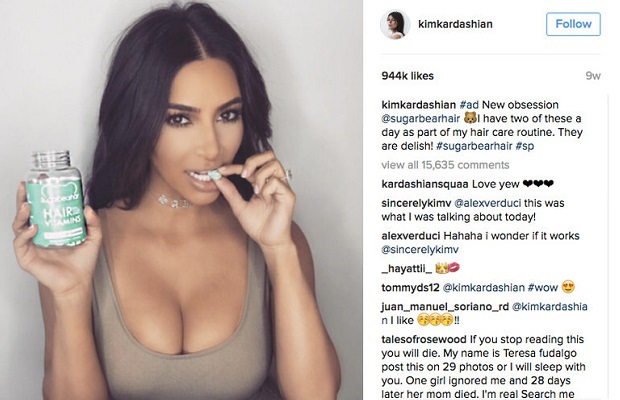Celebrities and “influencers” in the US have been warned to clearly identify when they are promoting products on Instagram in return for payment.
Consumer regulator the Federal Trade Commission (FTC) sent letters to more than 90 individuals and marketing firms, though it has not revealed who was put on notice.
It is the first time the regulator has intervened on the issue in the US.
Points made by the regulator in the letters include:
- Some disclosures which had been made were not clear enough. It said that “#sp,” (an abbreviation for sponsored), “Thanks [Brand],” or “#partner” in an Instagram post did not make it obvious to many people that a post was paid for.
- Instagram users on smartphones typically see just the first three lines of text on a post, unless they expand it. Therefore disclosures should be made high up in the post.
- When multiple tags, hashtags, or links are used, readers may just skip over them – meaning a disclosure may not be conspicuous.
Many endorsement posts are not being labelled clearly enough in the captions, according to the FTC.
Posts from celebrities like Rihanna, Rita Ora and Kim Kardashian and Kylie Jenner – who were also warned last year – have been cited out of 113 examples.
Celebrities and social media stars have been warned that they are breaking the law by promoting products on Instagram without admitting they are being paid to do it (pictured, Kim Kardashian writes #ad to make her endorsements clear)
The posts risk breaching consumer rights rules by not revealing when they are promoting products on the social media site.
The US consumer regulator has sent a letter to 90 high profile users of the Facebook-owned site in response to concerns raised by consumer rights group Public Citizen.
No accounts or users were named by the FTC in their warning.
The FTC also said use of the hashtags ‘#sp’ – short for sponsored – or ‘#partner’ were insufficient ways of alerting users to endorsement posts.
Guidelines explained that writing a simple caption like ‘Company X gave me this product to try…’ will usually be effective.
The Commission said its warning letters told social media ‘influencers’ they must ‘clearly and conspicuously’ disclose when they have been paid to endorse a product or received it for free in return for promotion, and offered guidance on how to present these posts.
In a statement the Commission said: ‘In addition to providing background information on when and how marketers and influencers should disclose a material connection in an advertisement, the letters each addressed one point specific to Instagram posts – consumers viewing Instagram posts on mobile devices typically see only the first three lines of a longer post unless they click ‘more’, which many may not do.
In one ezapmle, Kylie Jenner changed a caption on an Instagram picture of a lavish mansion in Turks and Caicos from ‘Thanks for the birthday home, @airbnb’ to ‘Thanks for the gift of a lovely birthday home, @airbnb’ to make it clearer it was an endorsment .
The Commission also warned that including endorsement references within a string of hashtags could still be considered a breach of the guidelines.
‘The letters also noted that when multiple tags, hashtags, or links are used, readers may just skip over them, especially when they appear at the end of a long post – meaning that a disclosure placed in such a string is not likely to be conspicuous,’ they said.
This is the first time the Commission has intervened on the issue on social media, but last year did reach a settlement with Warner Bros over claims the firm did not disclose it had paid high-profile YouTubers to promote one of its video games.
Sponsored posts on Instagram can rake in hundreds of thousands of dollars.
Kim Kardashian reportedly earns $500,000 for a ‘campaign’ worth of endorsements, according to US Weekly.
The intervention was part-prompted by the advocacy group Public Citizen which carried out its own investigation last year, naming celebrities including Rihanna and Kim Kardashian among 113 influencers who it said endorsed a product without disclosure.
“Instagram has become a Wild West of disguised advertising, targeting young people and especially young women,” the group said.
“It is often unclear whether an Instagram user is paid to post a product endorsement or if they genuinely use it. That’s exactly why brands are using influencer marketing as a primary way to reach young consumers. But without clear disclosure, brands are deceiving consumers and reaping the monetary benefits.”
